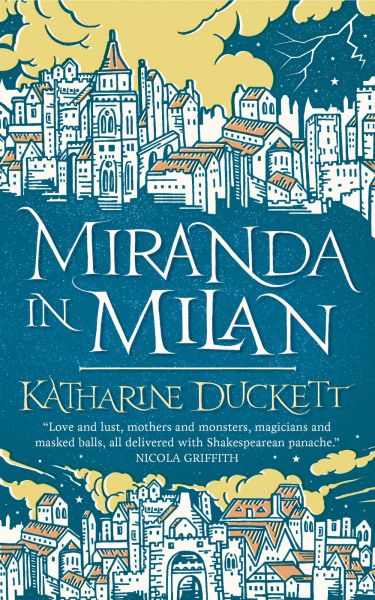Love and Pain
Miranda in Milan
By Katharine Duckett

29 Dec, 2018
0 comments
Katharine Duckett’s Miranda in Milan is a standalone historical fantasy novella. It is Duckett’s book debut1.
Restored to his dukedom, Prospero returns to Milan, bringing with him his daughter Miranda. Miranda was raised on Prospero’s uncharted island and finds Milan a bewildering, alien city.
A bewildering, alien, and hostile city.
Although she was promised in marriage to Ferdinand, Prince of Naples, Miranda is trapped in Milan until such time as her fiancé sends for her. No letters from Ferdinand arrive. Until then, she must endure a hostile palace and inexplicable rules.
The servants appear to hate and fear her. She is told that if she leaves her room, she must be veiled. There is a portrait of her mother prominently placed in a palace hall — also veiled. Her father claims to have forgiven his usurping brother Antonio — but Antonio is chained in a hidden dungeon. None of this is explained. Servants won’t help her and she fears to bother her quick-tempered dad with questions.
Little wonder that Miranda is quick to embrace her first real friend in the palace, the servant girl Dorothea. Dorothea has magical powers, of sorts, but not of the sort that would lead to a career. Thus serving in the palace. Still, she’s a useful ally. She knows the world in which Miranda finds herself; she does wield genuine magic; she genuinely likes (well, loves) Miranda.
With Dorothea’s help, Miranda unravels the palace mysteries: why and how her mother died, why Prospero was exiled from Milan. Knowing why helps only a little: knowledge is not always comfortable.
~oOo~
Spoiler: this is not the sort of lesbian romance that ends in tragedy. You may think it’s heading there, but keep reading.
This is the second book about Miranda that I’ve read in the last eighteen months, the other being Miranda and Caliban.

It’s not that odd that contemporary authors have chosen to rewrite Shakespeare and give his women better endings than Shakespeare did2. It is a little odd that two authors would independently select the same woman from all the women who were so poorly served by Shakespeare … but that is the sort of meaningless coincidence for which SFF is famous3. The two novels are utterly unlike each other.
I closed this book concerned that Miranda’s precipitous decision at book’s end may prove misguided. That’s a testimony to the author’s skill in making Miranda a character about whose fate the reader will care. This is the first of Duckett’s works that I have encountered. I will have to seek out more.
Miranda in Milan is available for pre-order here (Amazon) and here (Chapters-Indigo).
1: It’s not her debut in the sense of her first published work, but it is her first work that is neither published in a magazine nor in an anthology. Thank you tor dot com for handing me books for which I lack the proper terms.
2: I would like a version of Much Ado About Nothing in which Hero dumps that jerk Claudio and moves to a women’s collective.
3: You are invited to list others in comments.
